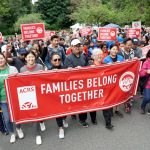AAPI-led national coalition, Congress members to voice opposition of Public Charge rule change
Last month, the White House released a memo that outlines clearer penalties for a sponsor who assists an immigrant family to access public benefits that they may be eligible for. This comes at a time where the Administration has taken other actions related to public charge that aim to limit family immigration and separate families such as expanding the scope of federal programs that were previously excluded from the public charge rule (Medicaid, Supplemental Nutrition Assistance Program, Medicare Part D, and several housing programs). Compound this with another recently proposed rule requiring every member of a household who is using housing subsidy must be a legal U.S. resident or citizen, which may result in over 55,000 U.S. resident or citizen children to become homeless (US News & World Report).
Airing on CSPAN Tuesday, June 11, starting as early as 3:00 p.m. PST, One Nation, an AAPI-led national coalition of organizations from across the country, will join members of Congress as they announce a Special Order on public charge. The goal for the Special Order announcement by Congress is to make sure Asian American Pacific Islander communities recognize that public charge is a key issue for our communities as we enter into 2020.
CLICK HERE to watch or listen to the Special Order.
What is Public Charge?
If the U.S. government thinks a legal immigrant might rely on them as the main source of support at any point in time, they label you a “public charge.”
If one is labeled a “public charge,” the U.S. can stop you from coming to the U.S. and turn down your application for lawful permanent residence (aka “green card”).
Proposed changes to Public Charge
The government wants to expand who can be labeled a “public charge” by adding more benefits that can put you at risk, including healthcare, food assistance, and housing assistance.
They want to use these factors to judge whether you might rely on public assistance at any time in the future: age, health, income and assets, family size, education and skill, and how well you speak English.
So even if you don’t use benefits, if they think you or someone in your family might at any point in time, you could be labeled a “public charge.”
1 in 3 Asian Americans and Pacific Islanders (AAPI) who speak a native language are limited English proficient, and AAPIs make up 40% of family-based immigration, so many families in Asian American Pacific Islander communities would be hurt by the proposed rule change.*
*Source: One Nation AAPI






